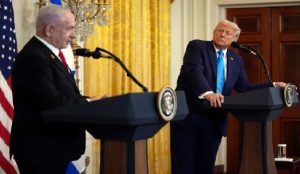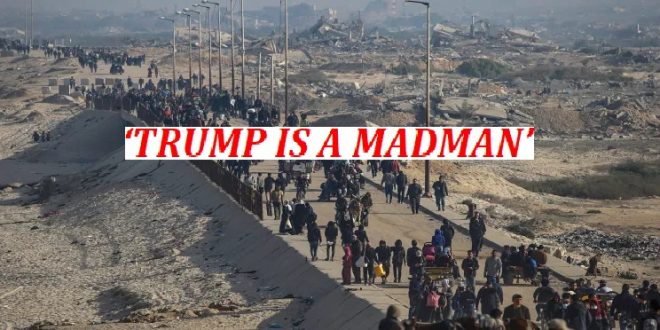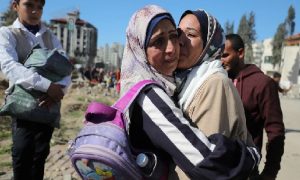07-02-2025
GAZA STRIP/ KHAN UOUNIS: Leaning on a wooden cane, 72-year-old Fathi Abu al-Saeed navigates the rubble-strewn streets of Khan Younis’s al-Katiba neighborhood, a daily ritual since he returned from displacement in the coastal region of al-Mawasi following the January 19 Gaza ceasefire. Carefully stepping over debris left by 15 months of relentless Israeli bombardment, he raises his cane, pointing at a demolished house.
 “You see that pile of useless rubble?” he says. “That’s more precious than the United States and everything in it.”
“You see that pile of useless rubble?” he says. “That’s more precious than the United States and everything in it.”
His audience, a group of children, including some of his 50 children and grandchildren listens intently, undeterred by forecasts of heavy rain and strong winds. Others join them children from displaced families who have also returned, not to intact homes, but to the ruins of what once was. With nowhere else to go, they rebuild their lives among the wreckage.
Every morning, Abu al-Saeed exchanges words of resilience with neighbors. But on this day, US President Donald Trump’s recent remarks about Gaza his fantasy of clearing out its Palestinian population to build a “Riviera in the Middle East” offer new material for his sarcasm and defiance.
“Trump talks as if he’s a king handing out land,” Abu al-Saeed scoffs. “Maybe he should relocate his Israeli friends somewhere outside of Palestine and leave Gaza alone.”
Trump’s comments, which led to widespread condemnation, outlined a plan to resettle Palestinians in Gaza elsewhere while the US would “take over” and “own” the territory. Standing beside Israeli Prime Minister Benjamin Netanyahu, who faces an International Criminal Court (ICC) arrest warrant for war crimes in Gaza, Trump claimed Palestinians deserved better than their supposed “bad luck”.
On Wednesday, US Secretary of State Marco Rubio attempted to walk back Trump’s suggestion that Palestinians would be resettled “permanently”, saying they would need to live somewhere else in the “interim” as the enclave is rebuilt.
Throughout 15 months of Israeli bombing, more than 60 percent of Gaza’s infrastructure has been destroyed, including hospitals, universities and schools. Washington, under the previous US administration, was Israel’s biggest backer, sending $17.9bn in military aid during the first year of the war, the highest annual total ever.
“This is the talk of a madman,” Abu al-Saeed says. “And as we Arabs say: ‘If the speaker is a madman, let the listener be sane’. This man knows nothing about homeland, struggle, defiance, pride or Palestine.”
Dismissing Trump’s comments as absurd, Abu al-Saeed shakes his head. “That’s the best fantasy ever dreamt up by a world leader,” he says, shifting between disbelief and laughter. “Any sane person who knows Palestinians understands that leaving our homeland is like death itself. Did Trump really think we’d pack up and go after all this?”
For Abu al-Saeed, the idea of mass displacement is personal. His father was forced out of Jaffa now part of Israel by Zionist militias in 1948 when Israel was formed, and his mother’s family was expelled from the nearby village of Sarafand. He grew up on stories of that first catastrophe, the Nakba and now lives through another.
“We already know what it means to lose everything,” he says, gesturing at the ruins but “we also know what it means to hold on.” (Int’l Monitoring Desk)
 Pressmediaofindia
Pressmediaofindia





